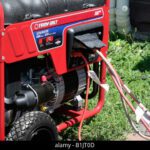Power Generators Hazards and Inspection

Posted on October 17, 2012
by Nick Gromicko https://www.nachi.org/generator-hazards-inspection.htm
Shared by: Orgova Home Inspections
Homeowners may use a generator to supply electricity to their home in the case of a power outage, either out of necessity or convenience. Inspectors may want to know about generators and the potential hazards they present when improperly wired or utilized.
Generator Types There are two main types of generators: permanently installed, standby generators; and gasoline-powered, portable generators. Standby Generators Standby generators typically operate on natural gas or liquid propane. They remain fixed in place outside the home and are designed to supply on-site power to specified circuits through a home’s electrical wiring. These generators work in tandem with a manual or automatic transfer switch (ATS), which automatically detects an interruption in grid-powered electricity and subsequently transfers over electrical input to the generator. The transfer switch suspends input from the generator once it senses that utility-powered electricity has resumed. Generators for small- to medium-size homes are typically air-cooled and employ fans to regulate the temperature inside the unit. Liquid-cooled units are used for the larger energy loads in larger homes. Some advantages of standby generators are as follows:
- They may be turned on manually, or they may be programmed to switch on automatically in the case of a power outage even when no one is home.
- Power may be supplied for extended periods of time.
- Hard-wired systems, such as a home’s furnace, well pump, and air conditioner may maintain continuous power.
- Uninterrupted power can be supplied to systems that must remain on continuously, such as medical equipment used for breathing, etc.
- Disadvantages of standby generators are as follows:
- Installation may require a permit.
- A qualified technician, such as an electrician, is required to install the ATS and to determine the electrical load requirements for the circuits in a home.
- Routine maintenance is required.
- Standby generators may be prohibitively expensive.
Portable Generators Gasoline-powered, portable generators are typically smaller in size and power capacity than permanently installed generators. They are designed so that corded electrical devices may be plugged directly into them. Advantages to portable generators are as follows:
- Portable generators are versatile. They may be used at home or transported and utilized in remote locations, such as a campground or a construction site.
- They do not require complicated installation – However, a transfer switch or lockout installed by a qualified electrician is an absolute must!
- They typically do not require permits.
- Portable units are generally less expensive than standby generators.
Disadvantages of portable generators:
- Devices that are hard-wired into a home’s electrical system cannot be powered by a portable generator if no transfer switch is installed.
Hazards
- Portable and standby generators produce dangerous carbon monoxide (CO) gas, which can be deadly if inhaled.
- Inexperienced installers are exposed to the risk of electrical shock. Only qualified electricians should attempt to install a generator.
- Overloading a generator may result in reduced fuel efficiency, damage to appliances, or fire.
- Standby generators or their required transfer switches that are incorrectly wired (or missing) may result in “back-feed” — a hazardous condition in which an electrical current is fed back into the grid — which could potentially electrocute and kill homeowners, utility workers, and others who are using the same utility transformer.
- Connecting a portable generator directly into a home’s wall outlet can also cause a dangerous back-feed.
- Generators that are exposed to water or are not properly grounded can cause electrocution.
- Gasoline for portable generators is highly flammable and may cause a fire when exposed to an open flame or when spilled on the hot generator.
- Over-taxed cords attached to a portable generator may cause a fire.

0 Comments